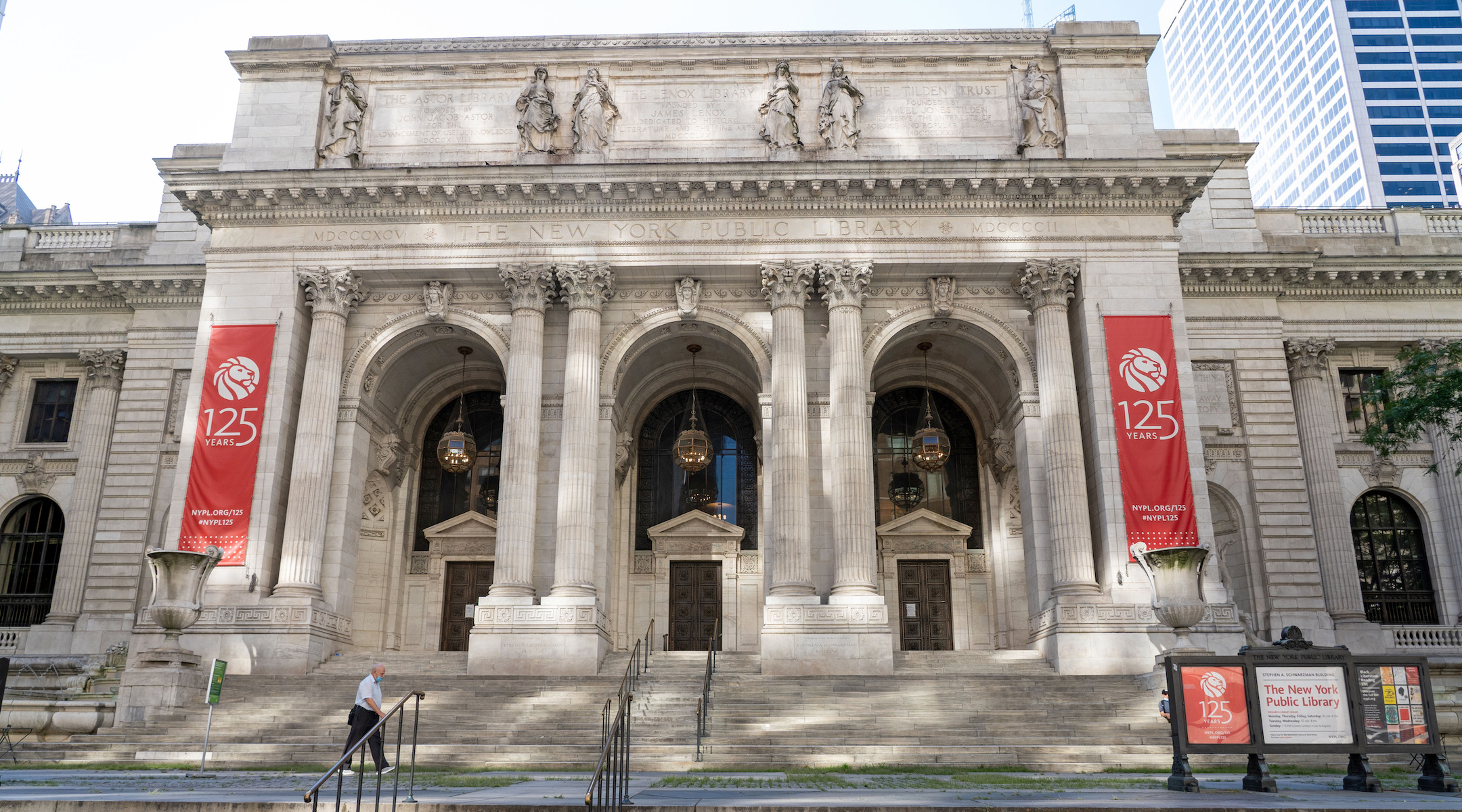No, New York libraries aren’t closing because of funding for Israel
A subset of New Yorkers railing against cuts to the city’s public library budget has blamed Israeli ‘genocide’

An exterior view of New York Public Library on Fifth Ave. in New York. (Ron Adar/SOPA Images/LightRocket via Getty Images)
(New York Jewish Week) — For months, a subset of New Yorkers has railed against reductions to the city’s public library budget, which has already forced some of them to close on Sundays.
This week, a few denizens of social media said they found a culprit for the cuts: Israel.
“New York Public Library now closed on Sundays because of $36.2M in budget cuts,” the posts say. “But NYC taxpayers sent $118,929,729 to Israel to commit genocide?”
The posts have spread far and wide in recent days. On Monday, a left-wing Twitter account posted that text, garnering more than 3 million views. The following day, a pro-Palestinian instagram account with nearly 100,000 followers reposted the message.
Is aid for Israel to blame for the library closures? In a word, no.
The anti-Israel flyers include a link to a webpage for the U.S. Campaign for Palestinian Rights, a Washington, D.C., nonprofit, which details the nearly $4 billion in federal aid sent to Israel annually. The roughly $119 million figure ostensibly represents the share of that aid paid from New Yorkers’ federal taxes.
But while New Yorkers pay federal, state and local taxes, the city’s public libraries are mostly funded by the New York City budget, in addition to private donations.
The city’s largest public library systems do receive some federal funding. But the social media posts are conflating two separate budgets: The library cuts they referred to were in the city budget enacted by City Council and the mayor. The federal budget, which includes aid to Israel, is separate and controlled by Congress and the president.
The city budget cuts came in November, proposed by Mayor Eric Adams. The New York Public Library said libraries would be ending service on Sundays as a result, beginning in mid-December, in the three boroughs where it operates. (Only eight of the New York Public Library’s 92 locations offered Sunday hours before the cuts.) It also said it would cut spending on materials and proograms. Adams announced this week that there would be no further cuts in next year’s budget.
Pro-Palestinian activists have previously tied society’s woes to Israel and targeted New York institutions with only tenuous connections to the Jewish state.
At a rally on the front steps of the New York Public Library’s main branch in November, a week ahead of the Sunday closures announcement, speakers blamed Israel for homelessness in New York City, among other problems. At that rally, activists also plastered stickers around the library blaming “Zionist donors” for meddling in universities.
In 2022, U.S. Rep. Alexandria Ocasio-Cortez of New York blamed aid to Israel for healthcare problems in the United States, drawing charges of antisemitism from Israel advocates.
On Monday, pro-Palestinian protesters targeted the Memorial Sloan Kettering cancer hospital in Manhattan for accepting a donation from billionaire hedge fund manager Ken Griffin. Griffin has spoken out against Harvard University students who blamed Israel for the Oct. 7 massacre of Israelis. The demonstrators said the hospital was “complicit” in “supporting genocide.”
Israel is usually the largest recipient of U.S. foreign military funding, although Ukraine received more aid following Russia’s 2022 invasion.
Foreign aid to Israel amounts to a minuscule amount of the total U.S. budget. Before the Gaza war, the United States provided Israel with $3.8 billion annually in aid for its military and missile defense. In 2022, the federal government spent $6.13 trillion.
The libraries have been damaged in connection with the Gaza war, however. After pro-Palestinian protesters defaced the library’s iconic main branch in November, the library said repairs would cost $75,000.
This article originally appeared on JTA.org.
A message from our Publisher & CEO Rachel Fishman Feddersen

I hope you appreciated this article. Before you go, I’d like to ask you to please support the Forward’s award-winning, nonprofit journalism so that we can be prepared for whatever news 2025 brings.
At a time when other newsrooms are closing or cutting back, the Forward has removed its paywall and invested additional resources to report on the ground from Israel and around the U.S. on the impact of the war, rising antisemitism and polarized discourse.
Readers like you make it all possible. Support our work by becoming a Forward Member and connect with our journalism and your community.
— Rachel Fishman Feddersen, Publisher and CEO
























